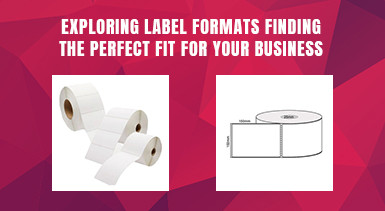Posted by Label Warehouse on 17th Aug 2023
Exploring Label Formats: Finding the Perfect Fit for Your Business
In the intricate world of business branding and product presentation, various label formats have emerged as essential tools for conveying information, amplifying brand identity, and captivating consumer interest. These formats govern the visual composition and application of labels on products, packaging, and materials, shaping the first impression your business makes on customers.
This blog embarks on a journey to unravel the intricate tapestry of label formats, exploring their diverse types, inherent advantages, and how businesses can deftly select the most fitting format to meet their distinct requirements.
What are Label Formats?
Label formats refer to the specific arrangements, designs, and structures used for creating labels that convey information, branding, and identification on products, packaging, or materials. These formats encompass the visual layout, typography, graphics, and overall composition of labels, defining how they appear and are applied to various items, and playing a crucial role in establishing brand identity, communicating essential details, and enhancing the visual appeal of products.
Different Types of Label Formats
Choosing the right label format is essential for efficient branding, product identification, and operational effectiveness. Different businesses require different types of labels based on their industry needs, production volume, and application methods. Below are the three main types of label formats used across various industries:
Custom Labels
Custom label are an embodiment of tailored precision. They are meticulously designed to resonate with your brand's identity. Custom labels infuse your products with a unique personality, utilising elements like logos, colour schemes, typography, and brand motifs.
Paper Rolls
Labels in the form of paper rolls excel in high-volume labelling endeavours. The versatility of this format shines when used with labelling machines, offering streamlined, automated applications. This is especially advantageous in industries where swiftness and uniformity are paramount.
Label Sheets
Label sheets offer an adaptable canvas for businesses with varied needs. These sheets contain multiple labels of the same design, organised in a grid pattern. They cater to businesses that require on-demand printing and manual application.
Advantages of Different Label Formats
Labels play a crucial role in product branding, consumer engagement, and regulatory compliance. Each label format offers unique benefits that enhance a brand’s visibility, provide essential information, and improve operational efficiency. Below are the key advantages of different label formats:
Brand Identity
Notably, custom labels take the lead in reinforcing brand identity. By maintaining consistency in branding elements, these labels establish a harmonious, memorable connection with consumers.
Provides Information
Labels are channels for providing crucial information such as product details, usage instructions, ingredients, and safety warnings, thereby enhancing customer awareness.
Distinctive
The uniqueness of label designs empowers products to emerge from the bustling sea of options, catching consumer attention and sparking curiosity.
Operational Efficiency
The efficiency of paper rolls and label sheets accelerates the labelling process, making them an ideal choice for businesses that necessitate swift production and application.
Industries That Use Label Formats
Labels are essential across various industries, serving as a tool for branding, regulatory compliance, and consumer guidance. Different sectors utilize specific label formats based on their unique requirements, ensuring clear communication and efficient product management. Below are some key industries that rely on label formats:
An array of industries harnesses diverse label formats to their advantage:
Food and Beverage
These sectors utilise labels for nutritional information, ingredient lists, and expiration dates.
Pharmaceuticals
Medication packaging is adorned with labels containing dosage instructions, safety advisories, and regulatory data.
Cosmetics
Cosmetic products feature labels that showcase branding, ingredient listings, and directions for application.
Retail
Retailers rely on labels for pricing, promotional information, and branding purposes on products.
Manufacturing
Industrial products, sports labels that provide essential product insights and safety guidelines.
How to Choose the Right Label Format for Your Business
Selecting the appropriate label format for your business requires a thoughtful assessment of various factors to ensure the chosen format aligns seamlessly with your branding objectives, production processes, and operational efficiency goals.
Define Your Goals
Begin by clarifying your primary goals for using labels. Determine whether you are primarily focused on reinforcing brand identity, conveying essential product information, complying with regulations, or a combination of these factors. Having a clear understanding of your objectives will guide your decision-making process.
Evaluate Production Volume
Consider the scale of label production your business requires. If your operations involve producing a high volume of labelled products, formats like paper rolls might be advantageous due to their efficiency and compatibility with labelling machines. For smaller quantities or specialised needs, label sheets or custom labels could be more suitable.
Embrace Brand Consistency
If maintaining a consistent brand identity is paramount, prioritise formats that allow for custom designs. Custom labels offer the flexibility to incorporate your brand's visual elements, such as logos, colours, and fonts, ensuring that your products align seamlessly with your brand's aesthetics.
Analyse Operational Efficiency
Evaluate the efficiency of your labelling process. If your business demands rapid and automated label application, paper rolls in conjunction with labelling machines can significantly enhance your operational efficiency. On the other hand, if you require flexibility in label sizes or the ability to print on demand, label sheets might be a better fit.
Consider Budget Constraints
Take into account the budget allocated for label production. Custom labels often involve initial design and setup costs, whereas paper rolls and label sheets might offer cost-effective solutions, especially for large quantities.
Think About Application Method
Reflect on how labels will be applied to your products. Automated application methods are best suited for paper rolls, while label sheets allow for manual application. Consider the equipment available to you and the level of automation required for your production process.
Anticipate Future Needs
As your business grows, your labelling needs may evolve. Choose a label format that accommodates potential changes in your product line, branding, or production volume. Opt for a format that offers scalability and adaptability to ensure long-term viability.
Seek Professional Expertise
If you're uncertain about which label format is best for your business, consider consulting professionals in the printing and labelling industry. They can provide valuable insights based on your specific requirements and guide you toward the most suitable format.
Test and Iterate
Before fully committing to a specific label format, consider testing it on a smaller scale. This allows you to assess its effectiveness, gather feedback, and make any necessary adjustments before implementing it across your entire product range.
Make an Informed Decision
Armed with a thorough understanding of your business’s needs and the advantages of each label format, make an informed decision. Choose the label format that aligns most effectively with your goals, operational processes, and budget considerations.
Conclusion
Label formats emerge as commanding pillars in branding, information dissemination, and efficient labelling operations across multifarious industries. The trinity of custom labels, paper rolls, and label sheets each proffers a distinct array of merits, catering to different business requirements.
If you are looking to buy premium quality custom label format for sale online in Australia or any other type of label format for sale, Label Warehouse is your one-stop destination. Browse through our inventory and shop for the perfect fit for your business today!

